Minimum Essential Media-MAX (MEM-MAX) in Hanks’ Buffer
Minimum Essential Media MAX (MEM-MAX) in Hanks’ Buffer contains L-Alanyl-L-Glutamine, therefore supplying a longer shelf life. MEM-MAX in HBBS significantly improves cell viability and growth. We manufacture several types of MEM-MAX based on your requirements.
Description
Background
Minimum Essential Media MAX (MEM-MAX) in Hanks’ Buffer is a commonly used media for Mammalian cell culture.
Advantages
The advantages of MEM-MAX over MEM are:
- Higher PH Capacity
- Moreover, it contains 4 mM L-Alanyl-L-Glutamine (0.869 g/L) instead of L-Glutamine and therefore:
- Possess longer shelf life.
- More importantly, minimizes toxic ammonia build-up.
- Significantly improves cell viability and growth.
- Remains stable across a wide range of temperatures.
- Improves the culture of primary cells.
Mechanism
Although L-glutamine is a vital amino acid, it degrades, generating toxic ammonia and pyrrolidine carboxylic acid. One way to minimize L-glutamine degradation in media is to gradually add these amino acids to your cell culture. However, keeping track of time to keep the amount of L-glutamine at the same level is tedious, if not impossible.
Alternatively, L-alanyl-L-glutamine can be used because it is much more stable in aqueous solutions. More importantly, it does not easily degrade and gradually releases aminopeptidases. As a result, L-glutamine and L-alanine are then used by the cells for protein production in the TCA cycle.
In addition to our Max formulation products, we manufacture PurMaTM GluaSup (Cat# P3S210 559) is a combination of L-alanyl-L-glutamine that prevents the degradation of L-glutamine.
Contents
Minimum Essential Media MAX (MEM-MAX) in Hanks’ Buffer contains:
- 5 mM sodium pyruvate
- High glucose (4.5g/L)
- Non-Essential Amino Acids
- 3.7 g/L Sodium Bicarbonate; PurMa Biologics Manufactures several types of MEM-MAX based on the amount of Sodium Bicarbonate and HEPES (PH capacity)
- Phenol Red
MEM-MAX in HBBS contains no proteins, lipids, or growth factors. Therefore, it requires supplementation, commonly with 10% Fetal bovine Serum (FBS).
Formulation
For the complete formulation click here: MEM-MAX (HBSS) Formulation in Hanks’ Buffer
References
- Culture of granulosa cells in collagen gels: the influence of cell shape on steroidogenesis. Carnegie JA, et al. Biol Reprod. 1988 May;38(4):881-90. doi: 10.1095/biolreprod38.4.881. PMID: 3401543
- Myelin formation in rat dorsal root ganglion cultured in a serum-free medium. Ninomiya T, Takahashi K. J Anat. 1987 Jun;152:209-13. PMID: 3654371
- Long-term organ culture of hamster cheek pouch mucosa. Mock D, Main JH. J Oral Pathol. 1976 Jul;5(4):237-40. doi: 10.1111/j.1600-0714.1976.tb01770.x. PMID: 820846
| Parameter | Specification |
|---|---|
| Appearance | Red, clear liquid |
| pH | 7.2 ± 0.1 |
| Osmolality | 275-360 mOsm/L |
| Endotoxin | NMT< 2EU/mL |
| Mycoplasma | Negative |
| Suitability | Suitable for mammalian cell culture |
| Additive | N/A |
| Indicator | Phenol red |
| Mycoplasma Detection | Negative |
| Sterility Tested | Sterile filtered using 0.22 µm filter |
| Form | Liquid |
| Shipping Condition | Room temperature |
Additional information
| Condition | MEM- MAX (HBSS) Standard Formulation, MEM- MAX (HBSS) w/o Phenol Red, MEM- MAX (HBSS) w/o Sodium Bicarbonate, MEM- MAX (HBSS) w/o Glucose, MEM- MAX (HBSS) 15 mM HEPES (3.6 g/L), MEM- MAX (HBSS) 25 mM HEPES (5.9 g/L), MEM- MAX (HBSS) With Sodium Pyruvate (0.11 g/L), MEM- MAX (HBSS) High Sodium Bicarbonate (0.85 g/L), MEM- MAX (HBSS) High Glucose (4.5 g/L), MEM- MAX (HBSS) 15 mM HEPES (3.6 g/L), High Glucose (4.5 g/L), MEM- MAX (HBSS) 25 mM HEPES (5.9 g/L), High Glucose (4.5 g/L) |
|---|---|
| Format | Liquid, Powder |
| Size | 10 X 1000ml, 10 X 500ml, 1 x 500 ml, 6 x 500 ml, 1 x 1000 ml, 6 x 1000 ml, 1 x 10 L, 1 x 50 L |
39 reviews for Minimum Essential Media-MAX (MEM-MAX) in Hanks’ Buffer
Only logged in customers who have purchased this product may leave a review.

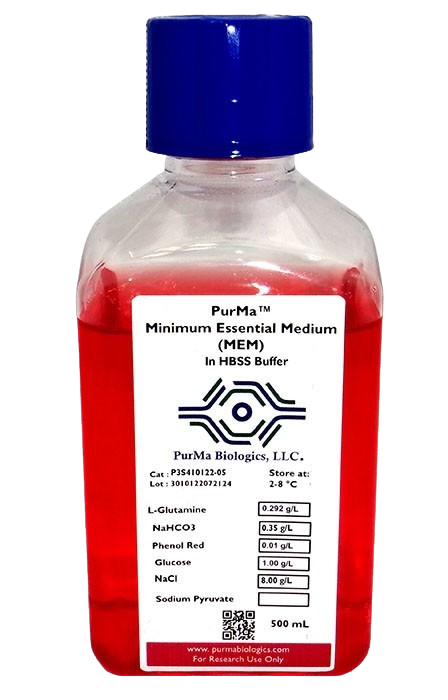
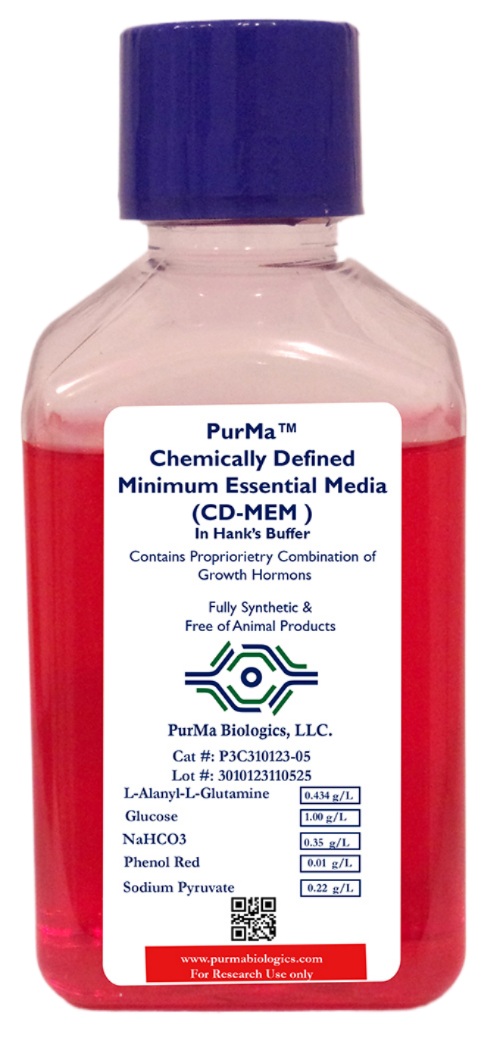
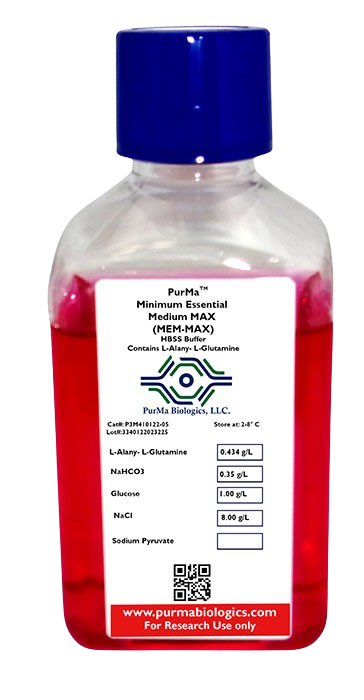
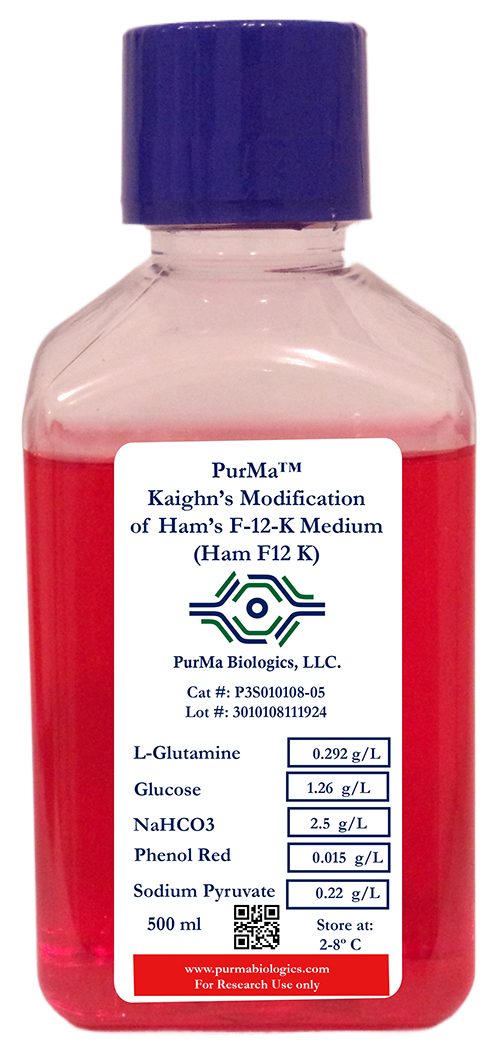
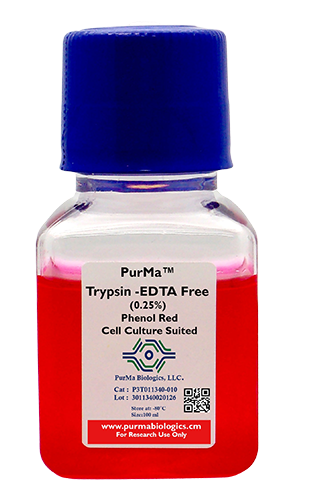
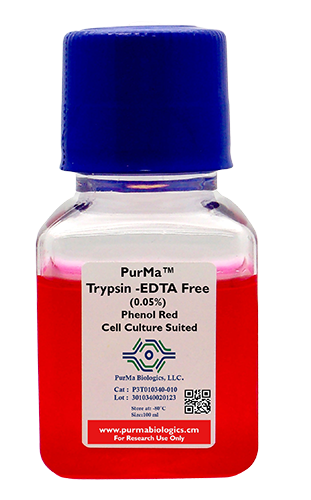

azadi@live.ca –
Review: we have purchased Lipid Depleted FBS , DMEM F12 …. they were good quality and decent price
Have you purchased: Yes
Time of submission: 29-Jan-2025 23:10:30
Ease of placing the order: 5/5
Anonymous –
Review:
Have you purchased:
Time of submission: 21-Feb-2025 15:30:00
Ease of placing the order: ‘not given’
Gregory-Mullen@ouhsc.edu –
Review: We buy *all* of our cell culture media, fetal bovine sera, and lipid-depleted sera from PurMa. The quality of their reagents is absolutely top-notch, giving us reliable, repeatable results in our experiments. We highly recommend PurMa!
Have you purchased: Yes
Time of submission: 21-Feb-2025 15:46:22
Ease of placing the order: 5/5
Anonymous –
Review:
Have you purchased:
Time of submission: 24-Feb-2025 13:50:14
Ease of placing the order: ‘not given’
lrothblu@ouhsc.edu –
Review: Serum worked beautifully. Cells grew well and had their usual cycle time. Tissue culture medium also worked very well.
Have you purchased: It is my first Purchase
Time of submission: 24-Feb-2025 13:53:22
Ease of placing the order: 5/5
Anonymous –
Review:
Have you purchased:
Time of submission: 27-Feb-2025 17:42:44
Ease of placing the order: ‘not given’
Anonymous –
Review:
Have you purchased:
Time of submission: 05-Mar-2025 16:31:44
Ease of placing the order: ‘not given’
michael-rudolph@ouhsc.edu –
Review: I have worked directly with PurMa biologics on a number of projects ongoing in my lab. I find the media and the specialty Lipid Depleted Serum to be high quality and very consistent among batches, which is critical to our adipogenesis projects using primary stem cells. Also, the service from PurMa is outstanding for my lab.
Have you purchased: Yes
Time of submission: 05-Mar-2025 16:35:21
Ease of placing the order: 5/5
Anonymous –
Review:
Have you purchased:
Time of submission: 05-Mar-2025 17:29:13
Ease of placing the order: ‘not given’
Anonymous –
Review:
Have you purchased:
Time of submission: 10-Mar-2025 14:32:38
Ease of placing the order: ‘not given’
jkurien@hausbio.com –
Review: We have been working with PurMa biologics for the past several years , we buy cell culture related media like DMEM F12 and EMEM and Fetal Bovine Serum . We appreciate the high quality and reasonable price, and great customer service.
Have you purchased: Yes
Time of submission: 12-Mar-2025 12:34:09
Ease of placing the order: 5/5
hyeungk1968@gmail.comthe –
Review: I used Lipid Free horse serum of PurMa Biologics.
The quality is great!
Have you purchased: Yes
Time of submission: 17-Mar-2025 12:09:58
Ease of placing the order: 5/5
jaya-krishnan@omrf.org –
Review: I started my lab using the regular Gibco media components. We have shifted to Purma past 6 months and see no difference in the quality of our cell culture. Simply saying that Purma is cheaper, quicker to deliver and as good as Gibco. The best part was that Purma customized several media for our fish cell lines which was really helpful. Lastly, Seif walked through the customization of media over Zoom, that gave a lot of confidence for using those media solutions.
Have you purchased: Yes
Time of submission: 17-Mar-2025 14:22:58
Ease of placing the order: 4/5
tayyab-afzal@omrf.org –
Review: We bought Premium FBS and DMEM cell culture media from PurMa Biologics. We are using them for several mammalian cell line and primary cell culture and the cell growth is perfectly fine. We are totally satisfied with the product quality. Importantly as local vendor, we can have the product available as per our demand ASAP.
Have you purchased: Yes
Time of submission: 18-Mar-2025 10:01:50
Ease of placing the order: 5/5
Fitzkr@gmail.com –
Review: We purchase everything we need related to cell and tissue culture from PurMa, reagents like: DMEM, LL15, EMEM, FBS, trypsin, antibiotics mix100X and…
Always great quality, fast processing and shipping.
We are totally satisfied.
Have you purchased: Yes
Time of submission: 22-Mar-2025 10:47:00
Ease of placing the order: 5/5
vmadka@ouhsc.edu –
Review:
Have you purchased: Yes
Time of submission: 24-Mar-2025 15:02:40
Ease of placing the order: 4/5
Anupam-Mandal@ouhsc.edu –
Review: Excellent
Have you purchased: Yes
Time of submission: 24-Mar-2025 15:05:43
Ease of placing the order: 5/5
rohan-varshney@ouhsc.edu –
Review: Reliable and dependable products. We purchased lipid-depleted FBS (LD-FBS) from PurMa Biologics and it worked great. We cross-checked the lipid content in the serum by GC-MS and Triglyceride assay and as advertised, did not find any lipids in the FBS.
Have you purchased: Yes
Time of submission: 24-Mar-2025 15:06:38
Ease of placing the order: 5/5
Surendra-Shukla@ouhsc.edu –
Review: Very fast, efficient, and economic service. Great for new PIs like me.
Have you purchased: Yes
Time of submission: 25-Apr-2025 14:00:04
Ease of placing the order: 5/5
vmadka@ouhsc.edu –
Review:
Have you purchased: Yes
Time of submission: 24-Mar-2025 15:02:40
Ease of placing the order: 4/5
Anupam-Mandal@ouhsc.edu –
Review: Excellent
Have you purchased: Yes
Time of submission: 24-Mar-2025 15:05:43
Ease of placing the order: 5/5
anil-singh@ouhsc.edu –
Review: NA
Have you purchased: Yes
Time of submission: 25-Mar-2025 10:11:14
Ease of placing the order: 5/5
Surendra-Shukla@ouhsc.edu –
Review: Best quality products, best price.
Have you purchased: Yes
Time of submission: 18-Apr-2025 09:51:03
Ease of placing the order: 5/5
madhusmita-rout@ouhsc.edu –
Review:
Have you purchased: Yes
Time of submission: 21-Apr-2025 11:15:46
Ease of placing the order: 5/5
alexholloway@mesogen.com –
Review: This serum appears to be a high quality product and worked well for our needs. Purma has an extensive catalog for cell culturing supplies which we are glad we came across.
Have you purchased: It is my first Purchase
Time of submission: 24-Apr-2025 16:54:29
Ease of placing the order: 5/5
jkurien@hausbio.com –
Review: We have been working with PurMa biologics for the past several years , we buy cell culture related media like DMEM F12 and EMEM and Fetal Bovine Serum . We appreciate the high quality and reasonable price, and great customer service.
Have you purchased: Yes
Time of submission: 12-Mar-2025 12:34:09
Ease of placing the order: 5/5
lrothblu@ouhsc.edu –
Review: Serum worked beautifully. Cells grew well and had their usual cycle time. Tissue culture medium also worked very well.
Have you purchased: It is my first Purchase
Time of submission: 24-Feb-2025 13:53:22
Ease of placing the order: 5/5
hyeungk1968@gmail.comthe –
Review: I used Lipid Free horse serum of PurMa Biologics.
The quality is great!
Have you purchased: Yes
Time of submission: 17-Mar-2025 12:09:58
Ease of placing the order: 5/5
jaya-krishnan@omrf.org –
Review: I started my lab using the regular Gibco media components. We have shifted to Purma past 6 months and see no difference in the quality of our cell culture. Simply saying that Purma is cheaper, quicker to deliver and as good as Gibco. The best part was that Purma customized several media for our fish cell lines which was really helpful. Lastly, Seif walked through the customization of media over Zoom, that gave a lot of confidence for using those media solutions.
Have you purchased: Yes
Time of submission: 17-Mar-2025 14:22:58
Ease of placing the order: 4/5
michael-rudolph@ouhsc.edu –
Review: I have worked directly with PurMa biologics on a number of projects ongoing in my lab. I find the media and the specialty Lipid Depleted Serum to be high quality and very consistent among batches, which is critical to our adipogenesis projects using primary stem cells. Also, the service from PurMa is outstanding for my lab.
Have you purchased: Yes
Time of submission: 05-Mar-2025 16:35:21
Ease of placing the order: 5/5
tayyab-afzal@omrf.org –
Review: We bought Premium FBS and DMEM cell culture media from PurMa Biologics. We are using them for several mammalian cell line and primary cell culture and the cell growth is perfectly fine. We are totally satisfied with the product quality. Importantly as local vendor, we can have the product available as per our demand ASAP.
Have you purchased: Yes
Time of submission: 18-Mar-2025 10:01:50
Ease of placing the order: 5/5
Fitzkr@gmail.com –
Review: We purchase everything we need related to cell and tissue culture from PurMa, reagents like: DMEM, LL15, EMEM, FBS, trypsin, antibiotics mix100X and…
Always great quality, fast processing and shipping.
We are totally satisfied.
Have you purchased: Yes
Time of submission: 22-Mar-2025 10:47:00
Ease of placing the order: 5/5
Gregory-Mullen@ouhsc.edu –
Review: We buy *all* of our cell culture media, fetal bovine sera, and lipid-depleted sera from PurMa. The quality of their reagents is absolutely top-notch, giving us reliable, repeatable results in our experiments. We highly recommend PurMa!
Have you purchased: Yes
Time of submission: 21-Feb-2025 15:46:22
Ease of placing the order: 5/5
azadi@live.ca –
Review: we have purchased Lipid Depleted FBS , DMEM F12 …. they were good quality and decent price
Have you purchased: Yes
Time of submission: 29-Jan-2025 23:10:30
Ease of placing the order: 5/5
Ravi-Gor@ouhsc.edu –
Review: I recently had the pleasure of interacting with Dr. Seif Azadi, and I want to express my gratitude for his expertise and timely assistance. His knowledge and dedication were instrumental in addressing our lab’s needs efficiently.
Have you purchased: It is my first Purchase
Time of submission: 25-Jun-2025 12:00:09
Ease of placing the order: 5/5
xiangpeng-li@ou.edu –
Review: PurMa helped us with the customized medium. They are professional and friendly. I appreciate their great work.
Have you purchased: Yes
Time of submission: 14-Aug-2025 12:59:31
Ease of placing the order: 5/5
jianhua.song@appliedstemcell.com –
Review: it is reliable vendor!
Have you purchased: Yes
Time of submission: 07-Oct-2025 17:14:12
Ease of placing the order: 5/5
Zhenghui.Liu@appliedstemcell.com –
Review: We always buy our agarose from PurMa and have never been disappointed.
Have you purchased: Yes
Time of submission: 08-Oct-2025 11:17:53
Ease of placing the order: 5/5
ravi-gor@ou.edu –
Review: I recently had the pleasure of interacting with Dr. Seif Azadi from Purma Biologics, and I cannot thank him enough for his expertise and prompt assistance. His deep knowledge and dedication were instrumental in meeting our laboratory’s needs with remarkable efficiency.
We ordered FBS, DMEM, and Trypsin from Purma Biologics, and I’m thrilled to report that all the products have performed exceptionally well. They consistently deliver reproducible results, significantly enhancing the reliability of our experiments.
Thank you, Team Purma Biologics, for your good products and support!
Have you purchased: It is my first Purchase
Time of submission: 23-Oct-2025 17:30:25
Ease of placing the order: 5/5